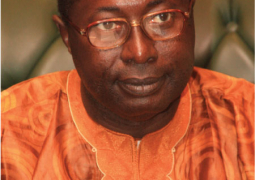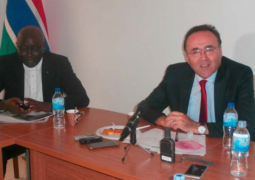Fellow Gambians, and Friends, of the
October 13th, marks, International Day for Disaster Reduction. This day, is observed and commemorated world-wide, by the international community, to bring to light, focus, and attention, the global challenges, faced by all nations and communities, arising from, the negative impacts of Climate Change, and human activities, on the environment, and society, in general which, inevitably result in disaster, sometimes. The theme for this Year is “CHILDREN and YOUNG PEOPLE, as partners for Disaster Risk Reduction.”
The global focus, on children and young people, is indeed relevant, and timely, considering the vulnerability of children, and young people, to disasters, of all forms, throughout the world. An estimated, 66 million children globally, are affected by disasters, every year. More and more people, suffer from earthquakes, cyclones, windstorms, droughts, and floods, and other natural hazards, and children, are some of the most traumatized. They often have difficulties, in coping, with unexpected and painful interruptions, to their lives, and in many cases, get separated from their parents and love ones, through abduction, forced labour, or abduction, in the guise of adoption.
This unique perspective of children, must therefore, be recognized, understood, and adequately included, in all disaster risk reduction strategies, and programmes. Repeatedly, portrayed as victims of Disaster, and Climate Change, Children and Young People, can, and should, be encouraged to participate, in Disaster Risk Reduction activities, and decision-making processes, i.e. Children on the Frontline, Children and Young People in Disaster Risk Reduction. They sometimes loose their Relatives, love ones entitlements, schools/classrooms, books, houses, dignity and even lives to disasters.
Child protection, must be a priority, before, during and after a disaster. Children need to be protected, from harmful behaviors and practices, especially, where they have to move away from their homes, as a result of a disaster.
Under such situations, they often feel insecure, at risk and unsafe, from negative vices, such as increased child-trafficking, child labour, and dropping out of school, as a result of disasters. Clearly, therefore, children’s psycho-social well-being, as well as, their physical security, is being routinely affected, by disasters. It is, therefore, of paramount importance, to prioritize, and include Children and Young People, in Disaster Risk Reduction Programming, if we are to collectively, harness, their positive energies, towards building safer and resilient communities.
In this regard, children should fully participate, in measures to tackle disaster risks, and climate change, by helping to disseminate key messages, and protect their communities, as well as, themselves. These can be done, through radio, village gatherings, and school visits, among others. They can only, effectively, do this, if they are given the opportunity, as citizens, in their own right, to contribute and engage, in Disaster Risk Reduction activities, within their communities.
Fellow Gambians,
Please remember, hazards have no borders, colour or economic level. Hazards are natural, while Disasters are human. They result from our own human decisions, and thus, are within our powers to change. The social groups of women, children and the poor, are those that suffer most, from disasters. These groups, need to be fully involved, in disaster management activities, from the planning stage, right through, to the implementation of risk reduction measures, as they are the best judges, of their own vulnerability.
This full involvement, will provide the basis, for sustainable solutions, to the root causes of disasters, within our communities, rather than repetitive bandages. Frameworks, can be global, and national, but solutions and actions, are predominantly local. In all these, awareness building is critical. The UN Superbly led global awareness, in building on climate change. The same awareness building, is now being led, by the UN, on disaster prevention and resilience.
This global awareness campaign, also recognizes the interlinkage, between Disaster Risk Reduction and Climate Change Adaptation, as two mutually - re-enforcing issues, that need to be integrated, in order to advance the cause, of national development. The role of Children and Youths, is paramount in every activity, that builds and supports, the national momentum, towards making our towns, cities, communities, infrastructure and economy, resilient, to the negative impacts, of climate change, and human induced hazards, among others.
Our children and youth, are the future leaders, of this country, and therefore, engaging them, on aspects that will help to shape the future, and destiny of our country would be a very noble undertaking. This constructive engagement, is nowhere more important than in the arena of disaster risk reduction. It is rightly for this reason, that the National Disaster Management Agency, under the Office of the Vice President (OVP) and in close consultation and collaboration with the National Youth Council, established, the “Young Ambassadors for Disaster Risk Reduction.”
This body, is a group of dedicated young boys and girls, who are fully committed, to partner with Government, to advance the course of disaster risk reduction, in their respective communities, homes and schools. They are indeed, our dedicated champions, ambassadors and focal points, for DRR, targeting their peers, in a crusade, to fully involve Children and Young People, throughout the country.
The Young Ambassadors, will work closely with the NDMA, to take DRR, to the schools, in a campaign, entitled, “DRR begins in Schools, and Campaigns, targeting students and Young People, for positive change”. I therefore call on all students, teachers and parents, to fully support, this important national crusade, as DRR Concepts, need to be inculcated, into students, at an early stage, in order to build, durable and sustainable, local and community resilience.
Fellow Gambians,
To conclude, one thought that emerges, is the notion of micro-resilience. If we exist today, it is because, our ancestors, practiced such micro-resilience. Our ancestors lacked the technology, communication and governmental omni-presence, we enjoy today, but they, greatly respected the forces of nature, and recognized the vulnerability of humans. Our ancestors, knew where to live, and how to build.
If what we are beginning, creates a million lights of resilience, then we, will all surely come closer, to achieving our common purpose. But we can only achieve this common purpose, if we invest today, for a safer, and better, and resilient tomorrow, and this investment, will yield the greatest dividends, if we invest in children and young people now. As we commemorate this day, let us remember and pray for all families affected by disaster to recover and rebuild their lives.
May Allah the Almighty continue to Bless our
I thank you all, for your kind attention.



